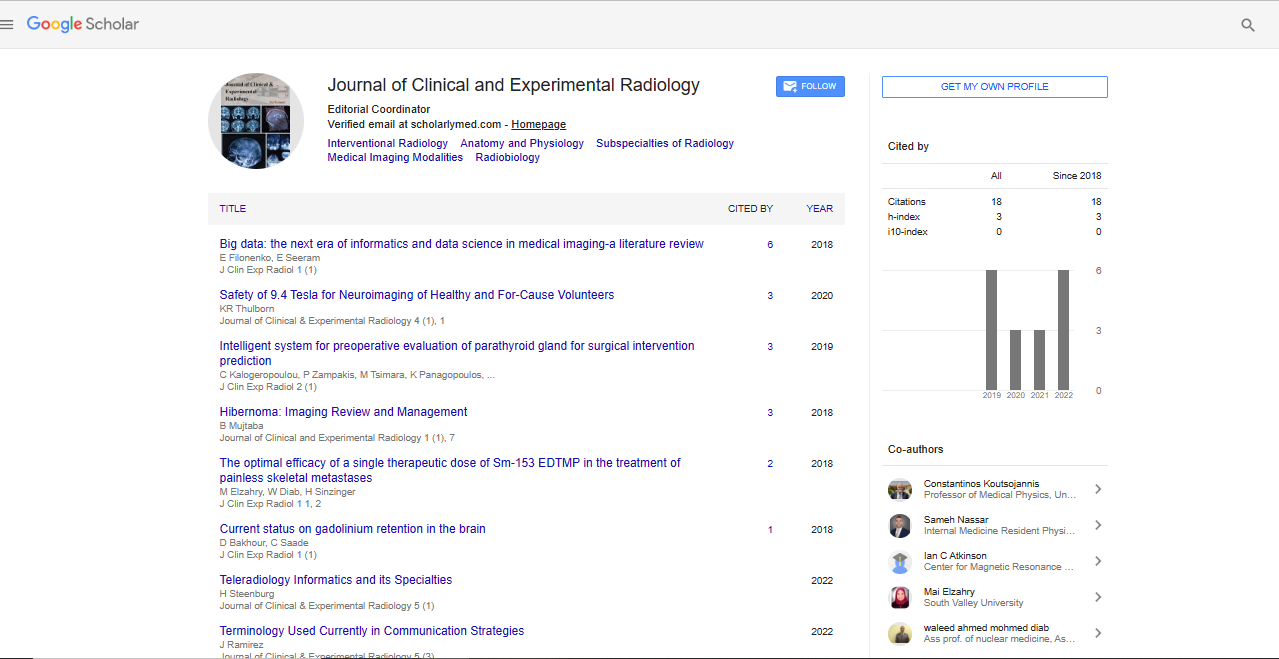Opinion Article, Vol: 6 Issue: 2
Challenges and Benefits of Combined Radiotherapy and Immunotherapy in Treatment of Cancer
Hoda Mostafa*
1Department of Nuclear and Radiation Safety Research Center, Egyptian Atomic Energy Authority, Egypt
*Corresponding Author: Hoda Mostafa,
Department, Nuclear and Radiation
Safety Research Center, Egyptian Atomic Energy Authority, Egypt
E-mail: Mostafa.hoda@ki.se
Received date: 30 August, 2023, Manuscript No. JCER-23-116584;
Editor assigned date: 01 September, 2023, PreQC No. JCER-23-116584 (PQ);
Reviewed date: 15 September, 2023, QC No. JCER-23-116584;
Revised date: 22 September, 2023, Manuscript No. JCER-23-116584 (R);
Published date: 29 September, 2023, DOI: 10.4172/jcer.1000144
Citation: Mostafa H (2023) Challenges and Benefits of Combined Radiotherapy and Immunotherapy in Treatment of Cancer. J Clin Exp Radiol 6:3.
Description
Cancer has long been one of the most formidable adversaries in the realm of medicine, posing significant challenges to researchers, clinicians, and patients alike. The treatment landscape has evolved considerably over the years, with advancements in radiation therapy and immunotherapy standing out as two of the most promising avenues. While these modalities have traditionally been employed independently, there is a growing recognition of the potential synergy between radiotherapy and immunotherapy in the battle against cancer. This essay explores the rationale behind combining these two approaches and the emerging evidence supporting their use for enhanced cancer treatment. Radiotherapy, the targeted delivery of high-energy ionizing radiation to cancer cells, has been a cornerstone of cancer treatment for over a century. Its effectiveness lies in its ability to damage and kill cancer cells while sparing healthy surrounding tissues. This approach has become increasingly precise with modern techniques such as Intensity-Modulated Radiation Therapy (IMRT) and Stereotactic Body Radiation Therapy (SBRT), which minimize collateral damage. However, radiotherapy alone may not be sufficient for complex and aggressive cancers, as it can fail to eradicate all malignant cells. Immunotherapy, on the other hand, harnesses the body's own immune system to recognize and attack cancer cells. Monoclonal antibodies, immune checkpoint inhibitors, and Chimeric Antigen Receptor (CAR) T-cell therapy are some of the diverse tools in the immunotherapy arsenal. These agents have revolutionized the treatment of various cancers, particularly those with a strong immune component, such as melanoma and certain types of lung cancer. However, not all patients respond to immunotherapy, and it is still a relatively new field with much to learn.
The potential synergy between radiotherapy and immunotherapy is grounded in several biological mechanisms. Radiotherapy can make cancer cells more visible to the immune system. When cancer cells are irradiated, they release Damage Associated Molecular Patterns (DAMPs) and antigens, which act as signals to the immune system. This process, known as immunogenic cell death, enhances the recognition of cancer cells as foreign invaders, potentially leading to an immune response against the tumor. Moreover, radiation can alter the tumor microenvironment, making it more conducive to immune cell infiltration and activation. Furthermore, the immune system's response can be boosted by immunotherapy. Immune checkpoint inhibitors, for instance, block inhibitory pathways that prevent immune cells from recognizing and attacking cancer cells. When combined with radiotherapy, these inhibitors can act synergistically by allowing the immune system to take full advantage of the increased tumor immunogenicity produced by radiation.
Clinical evidence supporting the combination of radiotherapy and immunotherapy is steadily accumulating. One of the landmark trials in this field is the PACIFIC trial, which investigated the use of the immune checkpoint inhibitor durvalumab after concurrent chemoradiotherapy in patients with unresectable stage III non-small cell lung cancer. This study showed a significant improvement in progression-free survival compared to placebo, marking a groundbreaking achievement in the field of combined therapy. The success of the PACIFIC trial has spurred further investigations into the potential of radiotherapy and immunotherapy combinations. Researchers are exploring these combinations in various cancer types, including melanoma, head and neck cancer, and prostate cancer. Promising results are emerging, suggesting that the synergy between these two modalities is not limited to lung cancer alone.
However, challenges remain in optimizing the use of radiotherapy and immunotherapy. Dosing and scheduling are critical factors to consider. The timing of immunotherapy administration concerning radiotherapy is of utmost importance. Administering immunotherapy concurrently with radiation, sequentially, or before or after radiation can all yield different results. It is a dynamic field that necessitates further research to unravel the optimal strategies for individual cancer types. Moreover, there is a need for better biomarkers to identify patients who are most likely to benefit from combined therapy. Not all patients respond equally to immunotherapy, and the ability to predict treatment outcomes and tailor therapy to the individual patient is crucial. Identifying predictive biomarkers will enable more personalized and effective treatment plans. Ethical and safety considerations also come into play. Combining two potent treatment modalities can lead to increased toxicity, as the immune system's response may result in collateral damage to healthy tissues. Striking the right balance between efficacy and safety is essential.
The combination of radiotherapy and immunotherapy represents a promising frontier in the fight against cancer. These two treatment modalities, each with its strengths and limitations, can be synergistic when employed together. Radiotherapy enhances the tumor's immunogenicity, while immunotherapy empowers the immune system to recognize and attack cancer cells. Clinical trials are beginning to validate the potential of this approach in a range of cancer types, offering new hope to patients. As we continue to delve into the complexities of combining radiotherapy and immunotherapy, it is imperative to refine dosing, scheduling, and patient selection to optimize outcomes. Additionally, the development of predictive biomarkers and ethical considerations are crucial aspects of this emerging field. With ongoing research and collaboration between oncologists, radiologists, and immunologists, the integration of radiotherapy and immunotherapy has the potential to revolutionize cancer treatment and bring us closer to the goal of more effective, personalized, and less toxic therapies for cancer patients.
 Spanish
Spanish  Chinese
Chinese  Russian
Russian  German
German  French
French  Japanese
Japanese  Portuguese
Portuguese  Hindi
Hindi 